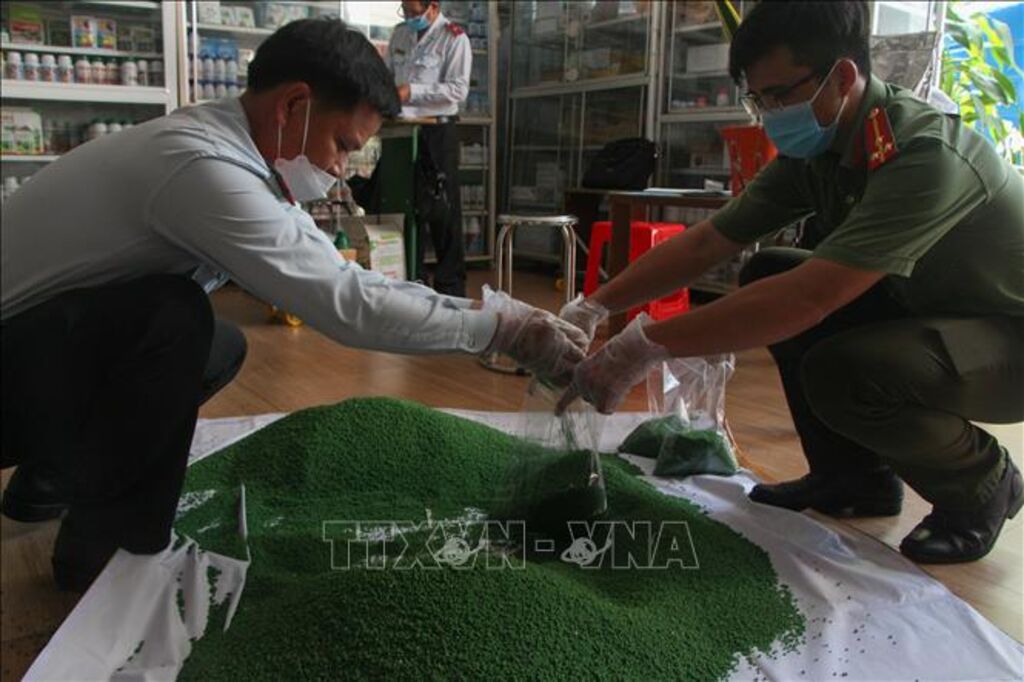 |
| An inspection team from the Department of Agriculture and Rural Development conducts sample collection at a fertilizer business in Hau Giang Province__Photo: VNA |
Inspectorates of ministries, government-attached agencies, general departments or departments under ministries, departments under provincial-level People’s Committees, and district-level administrations would no longer be tasked with conducting specialized inspections, according to the latest draft Inspection Law.
The draft law, presented by Government Inspector General Doan Hong Phong to the National Assembly at its ongoing 9th session on May 8, aims to address and minimize overlaps between inspection activities, state audits, and specialized inspections. The revisions are in line with Conclusion No. 134-KL/TW on the scheme for restructuring the inspection system, issued by the Politburo and the Secretariat on March 28, 2025.
Restructuring the inspection system
According to Conclusion No. 134-KL/TW, ministries and provincial departments will no longer perform specialized inspection functions, but instead will conduct specialized examination functions as prescribed by law. Ministries without inspectorates may request the Government Inspectorate to conduct inspections, while provincial departments may request their respective provincial inspectorates.
Once the reorganization is complete, the Government Inspectorate and provincial inspectorates are expected to be adequately staffed and resourced to conduct inspections across sectors, fields, and localities within their jurisdictions, thus meeting the requirements of state management.
Under Article 7 of the draft law, the system of inspection agencies includes: the Government Inspectorate; inspectorates of provinces and centrally run cities; inspection agencies within the People’s Army, the People’s Public Security, and the State Bank of Vietnam (including inspectorates of the Ministry of National Defense, the Ministry of Public Security, and the State Bank of Vietnam, along with other inspection bodies as regulated by the Government); the Cipher Inspectorate; and inspection bodies established under treaties to which Vietnam is a contracting party.
Notably, the draft law no longer distinguishes between administrative and specialized inspections, but instead provides for a unified type of inspection. The Government Inspectorate, provincial inspectorates, and other inspection bodies would conduct inspections following a unified procedure.
Addressing overlaps between inspection and state audit
Article 56.1 of the draft law states: “When conducting inspection or state audit activities, if any overlap is detected, the inspection agency shall coordinate with the state audit agency to resolve the issue, ensuring that a specific activity of an organization or individual is subject to review by either the inspection agency or the state audit agency.”
Due to differences in the purpose, content, scope, duration, procedures, and methods among inspection activities, specialized examinations, and other forms of oversight, any overlap in subject matter would be addressed through coordination, information exchange, and consensus among the relevant agencies on a case-by-case basis.
Expanding responsibilities and powers of the Government Inspectorate
The draft law also expands the responsibilities and powers of the Government Inspectorate. These include inspecting the implementation of policies, laws, tasks, and powers by agencies, organizations, units, and individuals under the management of ministries that do not have their own inspectorates, and overseeing compliance with laws in areas under their state management.
Similarly, provincial inspectorates would be tasked with inspecting the implementation of policies, laws, tasks, and powers by agencies, units, and individuals under departments and People’s Committees at all levels, and monitoring compliance with laws in areas under their state management.
This aligns with the fact that the Government Inspectorate and provincial inspectorates would take over several functions and tasks of ministerial inspectorates, as well as those of district-level and provincial department inspectorates, respectively.- (VLLF)









